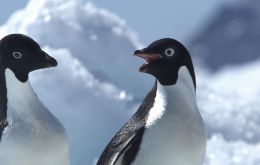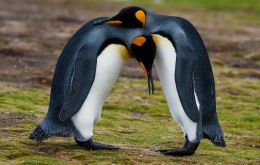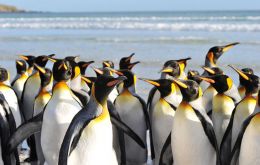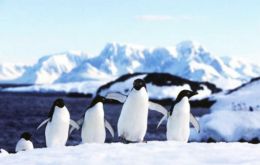MercoPress. South Atlantic News Agency
Tag: Adelie penguin
-
Sunday, April 25th 2021 - 23:21 UTC
World Penguin Day once again celebrated in times of Covid-19

This Sunday, April 25, is World Penguin Day's celebration, a creation by researchers at the McMurdo Station, an American scientific center on Antarctica's Ross Island to mark every year's migration of Adeline penguins to the north.
-
Friday, April 26th 2019 - 06:16 UTC
Meet the Falkland Islands penguins

By Chloe May - On 25 April every year, people around the world celebrate World Penguin Day - a day to raise awareness of the plight these flightless birds are currently facing. This takes place at the same time as the annual northern migration of Antarctica’s Adelie penguins and was created as a way for researchers at an American research centre on Ross Island to pass time and raise awareness.
-
Thursday, April 26th 2018 - 08:26 UTC
“World Penguin Day”: funny on land and graceful and rapid in the sea

April 25th is “World Penguin Day”, undoubtedly the world’s most popular bird – think of Happy Feet, March of the Penguins, Pingu just to name a few uses in popular culture. These charismatic flightless birds are funny to watch on land but are graceful and rapid in water. They occur only in the seas of the Southern hemisphere; there are seventeen species of penguin ranging from the Galapagos to Antarctica.
-
Tuesday, February 16th 2016 - 08:30 UTC
Blocked access to food in Antarctica kills an estimated 150.000 Adelie penguins

Scientists say an estimated 150,000 Adelie penguins have been wiped out on Antarctica's Cape Denison in the five years since a giant iceberg blocked their main access to food. A study recently published in the journal Antarctic Science says the B09B iceberg crashed with the Mertz Glacier Tongue and got stuck in Commonwealth Bay, an area that was rarely covered by sea-ice, making it ideal for Adelie penguin colonies.
-
Thursday, January 24th 2013 - 08:00 UTC
Adelie penguins filmed in underwater hunting skills with miniature video cameras

Miniature cameras attached to a penguin's head have given Japanese scientists a bird's eye view of the creature's incredible underwater hunting skills. Using video cameras weighing just 33 grams and equipped with accelerometers, depth gauges and thermometers, researchers were able to see exactly what the Adelie penguin sees when it goes out to catch krill and other prey in its native Antarctica.
-
Monday, June 11th 2012 - 03:15 UTC
“Depraved” sexual activities among penguins come to light a century later

Accounts of unusual sexual activities among penguins, observed a century ago by a member of Captain Scott's polar team are finally being made public.
-
Tuesday, April 12th 2011 - 20:20 UTC
Antarctica penguin species suffering from declining krill availability, says NOAA

A number of penguin species found in western Antarctica are declining as a result of a fall in the availability of krill, a study has suggested. Researchers, examining 30 years of data, said chinstrap and Adelie penguin numbers had been falling since 1986.
